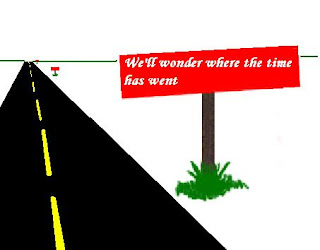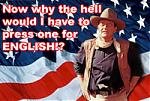
Saving The GOP From Itself: Duncan Hunter
Guest editorial by Alexander J Madison, Images added by Red-
The world changed dramatically in 1980 on the day former California Governor Ronald Reagan trounced the hapless Jimmy Carter in the Presidential election. This was perhaps the Democratic Party's and the US media's worst nightmare ever. Not only did America reject the "malaise" of the Carter years, but they embraced a California 'cowboy' who believed that America's best days were yet to come. And Reagan's coattails provided the opportunity for a number of staunch conservatives to invade the halls of congress, among them, a 33 year old Vietnam combat veteran who would prove to be one of President Reagan's most fearless allies, Duncan Hunter.
To liberals, academics and the employees of ABC, CBS, NBC and the New York Times, America had finally settled into the role it was supposed to play with the election of Carter in 1976. That role was to be a humble, accommodating nation on the world stage, no better or worse or assertive than other nations. We had 'lost' the Vietnam War and it was time to lose our "inordinate fear of communism". After all, capitalism has many warts, and communism offered an equally 'valid' model on which to base a society, they lectured. Other countries' national interests were as important as ours. The United Nations was the way forward to forming a more peaceful and hopeful and sharing world. The fall of South Vietnam was no cause for alarm, rather Yankee imperialism was the biggest culprit on the world stage. The Cold War was mostly America's fault and besides, the USSR was here to stay, so America might as well accept that 'fact' and learn to coexist. The communist infiltration in Central America and Africa was in fact just poor peasants demanding justice, and if Cuba and the USSR were helping them, so be it; justice is justice, they told us. Eastern Europe had 'free' health care for its citizens, after all.
One would think that the minority party during this period, the Republicans, would have been united and working overtime to save this nation from its drift into 'former superpower' status. Instead, a large portion of the party had come to accept not only the inevitability of coexistence with the USSR, but the inevitability of socialism in our own domestic policies. Indeed, it was Richard Nixon who swelled the size of the Federal bureaucracy with his creation of the EPA, OSHA, and Supplemental Security Income (SSI) programs. Nixon and Henry Kissinger were also the masterminds of the détente policy, a misguided attempt to appease the Soviets. His successor, Gerald Ford, continued the détente policy and continued the march towards Rockefeller republicanism, even going so far to name liberal Nelson Rockefeller as his Vice President. Ford's full throated support of the Equal Rights Amendment is all one needs to know about the direction of the GOP leadership in the 1970s.

Then the cowboy rode in. After two successful terms as California governor, Reagan nearly stole the GOP nomination four years earlier. Had he done so, perhaps the stain of the Carter Administration could have been avoided. Nevertheless, it was a 'new day' in America in November of 1980. There had not been such an optimistic, confident, visionary and conservative man elected president in many decades. Even powerful GOP opponents such as George Herbert Walker Bush (who labeled Reagan's economic plan "voodoo economics") and Howard Baker (who managed both Ford's and Bush's rival campaigns against the Gipper) came around to support this visionary, at least on the surface. But the nuts and bolts of Reagan's success was not due to GHWB, who was his mostly silent VP, or the moderate Baker, who served as Reagan's 2nd term Chief of Staff for 17 months. It came from Reagan's fellow true believers who went toe to toe each day with the liberals in power. Chief among them was Duncan Hunter.

Duncan Hunter has always understood the evils of communism. He was once quoted as saying the only place he wanted to see a communist "is on the end of my bayonet". Strong words, but illustrative of a man who understands evil when he see it, and was willing to do all he could to end that evil. Reagan recognized this, and in 1985, he gave young Congressman Hunter, a fellow Californian, the responsibility of leading a delegation to Europe to bring them on board with the vilified Strategic Defense Initiative (SDI), which Hunter had helped ramrod through the Congress. It worked. Even Jack Kemp, no foreign policy lightweight, credits Hunter and Henry Hyde for leading the way on SDI funding in the House. And Hunter has not relented since. He has staked out not only missile defenses as his territory, but our entire military and defense structure as areas of expertise. It was Hunter who was largely responsible for saving missile defense from certain death by neglect during the Clinton years, and his heroic efforts to do so put him at odds with the political appointees in the Pentagon. It was certainly not the first or last time that Hunter would lock horns with the Pentagon brass, and as has been the case each time, Hunter was right.
Obviously, Congressman Hunter shared Reagan's "we win, they lose" vision of communism and the absolute necessity of SDI. One could argue that most republicans did, since most voted Reagan's way. However, the 'go along to get along' GOP required strong-armed leadership, and Hunter stepped in to fill that void.
A perfect illustration of Hunter's leadership and vision on these matters occurred in 1987. President Reagan walked away from the summit in Reykjavik, Iceland without any agreements with Soviet Premier Gorbachev, a summit that had very high expectations worldwide. When the media found out it was Reagan's 'fault' – he refused to put SDI on the table – they went ballistic. The press in the US and around the globe heaped scornful article after scornful article on the President. The Democrats in congress were equally apoplectic, accusing Reagan of setting back US-Soviet relations by decades. The hysteria carried over into the House Armed Services Committee (HASC), of which Hunter was a member. Though nearly equal in numbers of Democrats and Republicans, a 13 member HASC subcommittee released a scathing assessment of the Reykjavik negotiations. "The result has been 'the appearance of confusion and frustration', a worried NATO alliance, and the retrospective possibility that 'the United States was `snookered' by a clever Soviet scheme' to gain unbalanced U.S. concessions or to fix the blame on Reagan for failure of the negotiations", reported the Chicago Sun Times. Les Aspin, Chairman of the committee, added that the summit meeting became "the textbook case on how the superpowers should NOT negotiate."
Also, according to the Sun Times, "One member of the 13-member panel, conservative Rep. Duncan Hunter (R-Calif.), filed a sharply worded six-page dissent, calling the report 'unprofessional' and a 'celebration of form over substance' dominated by 'political sniping.'" In other words, Hunter knew what Reagan did in Iceland: He put the Soviet Union in a very tight corner. With hindsight, most everyone has since agreed that it was Gorbachev, not Reagan, who got snookered. The Berlin wall came crashing down 2 years later. But only Hunter, amongst the supposed hawks (democrat and republican) on the HASC, had the vision to see clearly what was happening at the time. Hunter went to the mat for Reagan when even his own party was in despair. And Hunter was right.

In addition to helping clear the way for Reagan's defense spending and USSR policies, the San Diego Congressman also supported Reagan's historic tax cuts, his efforts to undermine communism in Central and South America, his rough handling of the United Nations, the bombing of Libya (with some particularly harsh words for France), and the attempts to shrink the federal government. Hunter even defended Reagan, as well as Oliver North, during the Iran Contra scandal.
Some have painted Hunter as just a loyal foot soldier in the Reagan Revolution. After all, it was Reagan's coattails that brought Hunter into the House. Loyalty is nice, but Reagan was the only visionary, and Hunter just a follower, so the logic goes. However, that perception is easily shattered. During the 1986 debates over the Immigration Reform and Control Act (IRCA), most politicians from both parties supported the idea of providing amnesty to millions of illegal aliens in exchange for 'tougher' enforcement of workplace rules and border security. Hunter, from the US-Mexico border district in California, knew better. Hunter argued that without a sealed border, the amnesty provisions would only lead to a flood of new illegal aliens waiting to catch the next amnesty wave. The bill passed and Reagan signed it, stating that "The legalization provisions in this act will go far to improve the lives of a class of individuals who now must hide in the shadows, without access to many of the benefits of a free and open society." Sounds vaguely familiar, huh? Hunter rejected such arguments and time has shown Hunter to be correct. Reagan later regretted the amnesty bill and Hunter spent the next 20 years doing everything he could, trying to slow the stampede he predicted would come.

So it comes as no surprise that Duncan Hunter has been the loudest and sanest voice in Congress since the 1980s regarding illegal immigration. Not only did Hunter force the Clinton Administration to build the San Diego border fence, but he also has made numerous proposals to reverse the sovereignty usurping, boondoggle immigration policies of both GOP and democratic administrations. Some were successful, and others were stifled by members of his own party. Over the years, Hunter forced significant increases in the number of Border Patrol (BP) agents, earmarked money for more detention facilities, wrote legislation to strip away all benefits for illegal aliens and punish 'sanctuary cities', and in 2006, single-handedly penned the Secure Fence Act, a bill signed by President Bush to extend the San Diego double border fence through the smuggling corridors of Arizona, New Mexico and Texas. In addition, Hunter has current legislation pending to force congressional oversight over the Executive Branch's attempts to establish a Security and Prosperity Partnership (SPP) with Mexico and Canada, a bill to free two BP agents who wounded an illegal alien narcotics smuggler, and amendments to stop all funding of the proposed NAFTA superhighway and to abort the program which will allow Mexican truckers unfettered access to American roads. Duncan Hunter is the visionary, and slowly but surely, the GOP is starting to follow. Even immigration milquetoasts like Mitt Romney, Rudy Giuliani and Fred Thompson are beginning to parrot some of Hunter's words, after spending careers sounding more like liberal democrats on the subject.
Other arguments made against Hunter concede that he has been a leader on National Security and illegal immigration issues, but that such accomplishments are not enough for a Presidential candidate. But a closer examination of Hunter's record, statements, and causes over his career reveal that it is he who has far greater presidential timber than his GOP rivals.
For example, in 1994, while Rudy Giuliani and Mitt Romney were singing the praises of the phony 'assault weapons ban' (AWB), in Rudy's case even lobbying on behalf of the Clinton Administration, Hunter was in the trenches fighting to kill it. He proposed the Hunter-Brewster crime bill as a pork-free and AWB free alternative to the omnibus Clinton directed bill. Hunter's version barely lost due to the 'moderates' in the party siding with Clinton, Rudy and Mitt. Many republicans supported the AWB, but Hunter had the vision to know that gun control was dead end street, not to mention ridiculously unconstitutional.
In 2000, after several years of annually renewing China on our country's Most Favored Nation trade partner list, the Clinton Administration decided to propose making that status permanent. Permanent Most Favored Nation status (also called Permanent Normal Trade Relations (PNTR)) was supported by most of the Republicans in the House and the Senate. They largely kowtowed to the big business and China lobbies running through the halls of Congress. Duncan Hunter had been sounding the alarm bells about communist China for many years. He illustrated example after example of China's corruption, underhanded tactics, military buildup and its treatment of the United States as a foe. Yet the dollar signs carried the day, despite the overwhelming evidence of China's robust espionage in the US, saber rattling over Taiwan, and its abysmal treatment of political and religious 'dissidents'. The GOP leaders simply downplayed its military and technological gains and insisted that trade would open the dialog with the communists and foment reform. They largely sided with Clinton, and it became law. Cold water was quickly tossed on the notion of reform in 2001 with the downing of a US reconnaissance plane and the subsequent hostage situation.

In 2007, it is glaringly obvious that the China appeasers were dead wrong, and that Hunter was right. From the $233 billion trade surplus with the US in 2006, to the relentless pirating of US software and other intellectual property, to the purchase of cutting edge Soviet made weapons systems, to its arming of terrorists in Iraq, to its most recent wave of persecution of Christians, China has proven to be the unworthy and untrustworthy adversary that Hunter has claimed all along. Hunter's rivals for the GOP nomination, John McCain, Sam Brownback and Fred Thompson all ignored Hunter's warnings and signed on with the Clinton machine.
When it comes to the protection of US sovereignty, no one has been as stalwart as Duncan Hunter. Most of the GOP has followed the path of 'free trade', as delineated by organizations such as the Wall Street Journal and the CATO Institute. Congressman Hunter saw the problem with this notion many years ago. Prior to the General Agreements on Tariffs and Trade (GATT) morphing into the World Trade Organization (WTO) in 1995, GATT was a system of negotiations between countries, often led by the US, to reduce tariffs, fostering freer trade amongst member nations. Something Adam Smith (and Duncan Hunter) could generally agree with. Nations could and did opt out of GATT agreements when it went against their national interest, and later sign on when they felt it was in their interests. GATT was non binding, other than the pressure member nations brought to bear for 'violations'. The creation of the WTO changed the game. Now, negotiations and enforcement were handed over to a new supra-national entity. No longer did the US have the ability to lock horns directly with a trade partner over a particular issue. Instead, the mechanisms and personnel for trade disputes were handed over to the WTO bureaucracy. Aside from the absolute fact that international bureaucracies seldom favor the United State's position, making our entry into the WTO absurd on its face, the surrender of sovereignty over our international commerce is anathema to Duncan Hunter's view of our constitution.
The WTO rejected President Bush's 2001 corporate tax cuts for US exporters and forced the US government to rescind them, calling them an unfair subsidy! Hunter told Human Events in a 2006:
"We have the right in our nation's interest, to abandon WTO in whole or in part, just as any nation has a right to abandon its international agreements. I think it's intolerable to allow the world trading system to have voted in essentially a subsidy directed at one nation-the United States-a subsidy on their end and a tariff on American exports to those nations, to lock that in as being allowed under WTO, and to not allow us under our system of taxation to effect reciprocity."
Once again, the rest of the GOP is slowly catching on, that surrender of our national sovereignty to any world body is not only stupid, but unconstitutional. Whether it's called the UN, the International Criminal Court, or the WTO, Hunter asserts that America must retain its ultimate authority to make decisions regarding American interests. As Ronald Reagan stated, "We are always willing to be trade partners but never trade patsies."
So now, fellow Republicans, it is another time for choosing. Shall we elect a man who has supported our losses in sovereignty to international bodies, or supported stripping away our constitutionally guaranteed First or Second Amendment rights, or turned a blind eye as our rival China gained unprecedented wealth and power at our expense, or just recently discovered that America really does need to halt the illegal alien stampede, or spent his career in the Rockefeller wing of the party only to blow the dust off of his Reagan 101 textbook for the election? Or shall we support the rarest of rarities, a man of vision, who intends to repeat Reagan's feat – of saving the GOP from itself, and saving America in the process?

Labels: Duncan the real deal Hunter, GoHunter08, reagan21




























 Crosstimbers Oak Firewood
Crosstimbers Oak Firewood

 MY-"BETTER HALF" !
MY-"BETTER HALF" ! Fear An Iarthair blog by Man of the West
Fear An Iarthair blog by Man of the West






































 AOL Sports Hottest Athlete
AOL Sports Hottest Athlete




